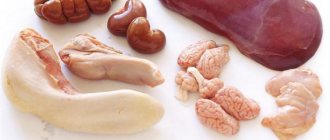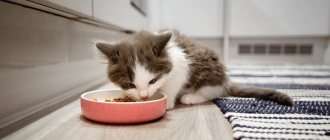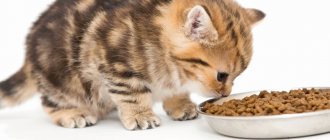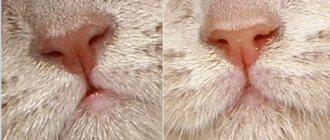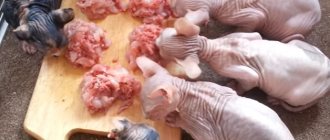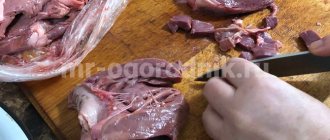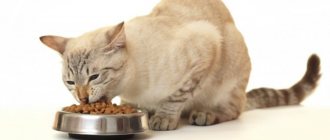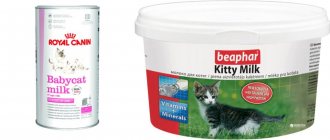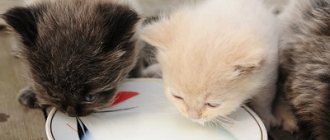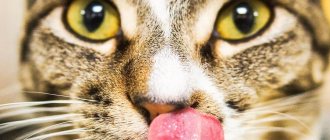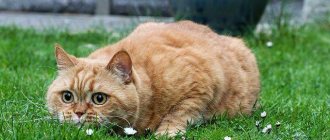Properly balanced natural food for British cats is always healthier than industrial food, even if it is high quality food. There are several reasons for this. This article talks about the benefits of natural nutrition and how to organize it correctly. After all, feeding British cats natural food is not the same as food from the human table. So what is the best thing to feed a British cat if we are talking about a natural cat?
What is natural nutrition?
Natural nutrition is not food from the table, i.e. not meatballs with pies and porridge. All this is good for humans, but not for cats. After all, she simply cannot afford most of the food from our table. And some foods are poisonous to cats. British cats' favorite foods don't always coincide with what's good for them. The fact is that cats can get used to junk food and really love it. Therefore, it is not always possible to follow the lead of your furry pet. So how to feed a British cat natural food without causing harm?
Article continues after advertisement
Felines are predators, that is, carnivores. The typical diet for their species is feeding primarily raw meat. Also, cats in nature can destroy a bird's nest and eat eggs.
Most of the infections that can be contained in raw meat are destroyed by the very acidic environment of the stomach of a carnivorous cat. Cats have much more acidic gastric juice than humans. However, it is not always able to destroy helminth eggs. To minimize the risk of infection with worms, it is necessary, firstly, to buy meat only from certified points of sale (livestock on large farms are dewormed while still alive). Secondly, the meat must be refrigerated in the freezer at a temperature no higher than -18 degrees Celsius for at least 3 days: this will kill the eggs.
But still, the main source of helminths for cats is not meat at all, but particles of earth that we bring home on our shoes and eating insects. Therefore, any cat, regardless of the type of food, needs periodic preventive deworming.
What can you give a British cat? What should you feed British cats?
When answering the question of what can British cats eat and what can a British cat be fed, it is worth remembering that a cat is a predator, and therefore its main product is meat. And not boiled, but raw. The fact is that during heat treatment, the protein goes into a form that is less digestible, and vitamins and other important substances that should maintain the cat’s health “leave” from it. The result of such a diet is a deficiency of substances and various diseases. Adding vitamins and minerals in tablet form does not always solve the problem 100%. In addition, supplements are sometimes overdosed, resulting in an even more dangerous condition called hypervitaminosis. It is almost impossible to create hypervitaminosis with raw meat.
Diet components
The basis of nutrition is raw meat of different varieties and muscle organs (heart and tongue) make up 60% of the diet: beef, chicken, turkey, rabbit, quail. There is controversy among cat breeders about pork: pigs can suffer from Aujeszky's virus, which is transmitted through raw meat and is fatal to cats. Freezing does not kill it. Each owner chooses whether to trust the seller in this regard. If in doubt, it is better not to feed pork.
Ideally, alternate and combine permitted types of meat, rather than giving just one. Although even from turkey, chicken or quail alone you can create a completely complete menu for life. At the same time, beef and rabbit meat are not recommended for a mono-ration, although they may well be part of the menu.
Article continues after advertisement
By-products (liver, spleen, kidneys, lungs, brains) should make up 10-15% of the diet. Cats usually do not like kidneys and lungs, and these organs do not have sufficient nutritional value, so you can do without them altogether. But it is recommended to give liver, but in the amount of approximately 5% of the diet, because in large quantities it weakens. At the same time, the liver is an excellent source of vitamin A, as well as blood, which is needed for salt to enter the body. Cats do not specifically add salt to their food, but they need the NaCl compound supplied with food, which is mostly found in organs that are blood depots. These are the liver and spleen. In addition, it is useful to add the blood dripping from the meat to the bowl.
If a British cat eats only meat, this is not yet a complete diet. By giving the cat only meat and offal, the owner risks causing various diseases of the musculoskeletal system and other body systems. In addition to these products, the cat needs sources of calcium.
Bones with meat grown on them, according to the BARF and Prey model natural nutrition systems, are an essential component of the diet, being a source of calcium. In the BARF and Prey model they make up about a third of the menu. The bones must be raw and not tubular. Usually these are chicken necks and heads. Ground turkey or duck heads and carcasses of chickens and quails are also used. Boiled and tubular bones lead to blockage and perforation of the intestines.
The question of whether or not to give a cat bones remains controversial in veterinary medicine. On the one hand, feeding on bones is associated with a certain risk if the animal is not completely healthy (which the owner may not know) or if they are given incorrectly. On the other hand, it is a great way to clean your teeth and is also the best source of calcium. If you choose a boneless diet, then you should be aware that it is critically depleted in calcium, and therefore calcium will have to be taken from other sources.
Sea fish of fatty varieties is an excellent dietary supplement (10% of the diet). For cats, it is, first of all, a source of fatty acids and vitamin D. A healthy cat needs 1-2 fish feedings per week or one piece of meat mix daily. Be sure to freeze the fish before serving it to your cat if you give it raw. But fish are often thermally treated for fear of helminths. When heat treating the product, it is better to bake it rather than boil it: this way, more nutrients remain in it. Read more about feeding cats fish here.
Eggs (quail and chicken) are an excellent addition. It is advisable to give raw eggs. Cats get salmonellosis only in exceptional cases. You can only give yolks. The option is worse, but also possible - boiled eggs. Due to the lecithin content in them, yolks will help prevent the accumulation of wool in the gastrointestinal tract, and will also saturate the body with vitamins B and D. Quail eggs can be given whole every other day, one at a time, chicken eggs - 1-2 times a week, without protein. In addition, the shell can be used as a source of calcium.
Fermented milk products (cottage cheese, kefir, yogurt) can be an excellent addition to food. They are not a mandatory part of the diet.
vegetables , but not just any kind. Zucchini, pumpkin and carrots work well. A cat is not able to absorb, for example, vitamins and minerals from plant components, but this is not necessary. Vegetables are added as a source of fiber in an amount of no more than 10% of the diet in order to improve stool. This is necessary for cats suffering from severe constipation. Typically, vegetables need no more than 5% of the diet. But you don’t have to add them at all if the cat doesn’t have a tendency to constipation.
Store-bought feed
Only high-quality premium and holistic industrial feeds are suitable for constant nutrition. Giving an animal economy-class food is highly discouraged, since it is not of high quality and the composition is unbalanced. In the future, if such food is regularly consumed, serious health problems may arise.
When choosing ready-made food, you can consult a veterinarian, or study the assortment in pet stores and choose food designed for the British breed. If a kitten purchased from a nursery has already been accustomed to dry food and eats only this way, you should feed the baby the same brand that the breeder used.
Recommended industrial feeds for the British breed
On mobile, you can scroll the table horizontally with your finger.
| Food name/class | Features and Benefits | Flaws |
| Royal Canin British Shorthair (premium) | A special food developed only for the British breed. The food granules have a large, curved shape, which is why the animal cannot swallow it whole, and the granules themselves promote active cleansing of the teeth and oral cavity. The composition contains taurine, Omega-3 acids, which strengthen the heart and circulatory system. | Natural meat and fish are replaced with proteins of plant origin. |
| Go! Natural Cat Chicken, Fruit, & Vegetable (holistic) | Protein – 32%. Components:
The composition contains taurine, which strengthens and supports the functioning of the heart. Suitable for feeding kittens and British adults. | Some components of the food are allergic and can cause allergies. |
| Hill's Nature's Best With Real Chicken Adult Cat (Premium) | Protein – 30%. Components:
The composition contains many vitamins and mineral elements. The food is intended for British children from 12 months, taking into account all their physiological characteristics. | The presence of corn in the composition can provoke an allergic reaction. |
| Earthborn Holistic, Primitive Feline Natural Cat Food (holistics) | Protein – 44%. Components:
Balanced composition, including calcium, vitamins, phosphorus. Suitable for animals that must follow a diet. | High price. |
| Bosch Sanabelle Grande (super premium) | Proteins – 31%. Components:
Mussels help strengthen joint and cartilage tissue. The food contains Yucca extract, which reduces the odor of cat excrement. Helps prevent the formation of kidney stones. | Quite a high cost. Lack of information from the manufacturer regarding the type of antioxidant included in the feed. |
Ready-made dry and wet food for little British dogs
According to veterinary experts, Petreet Natura, Royal Canin Kitten, Brit Care Kitten, Purina Pro Plan are suitable for British kittens.
What should you not feed British cats?
Here is a list of prohibited and not recommended products for British cats:
- onion and garlic;
- eggplant;
- avocado;
- grape;
- cereals;
- bread and pasta;
- mushrooms;
- spices;
- raw river fish;
- chocolate and cocoa;
- coffee;
- salty, spicy, pickled;
- fried and smoked;
- milk in large quantities;
- citrus;
- legumes;
- potato;
- boiled and tubular bones;
- meat of wild animals;
- children's canned food.
Let's talk separately about what kind of porridge to feed a British kitten. Readers often ask this question, but the answer is one: none. Grains are bad for cats. If you want to learn more about the topic, we recommend reading this article.
Article continues after advertisement
Feeding a British baby at 2 months
The first month of the furry baby's life has passed. His body now requires additional elements. Before feeding a 2-month-old British breed kitten, you need to study the list of acceptable foods necessary for proper growth and development.
Starting from 4-5 weeks of life, solid food can be gradually introduced into the menu. It is better to start with low-fat beef, previously frozen and finely chopped. For one feeding, a serving of 10-15 g is sufficient.
Your baby's diet should also include:
- fresh milk;
- delicious milk porridges cooked with low-fat milk;
- natural soft cheese;
- low-fat cream;
- egg yolk;
- fresh cottage cheese.
You can supplement the menu with pates and canned food purchased from specialized pet stores or veterinary pharmacies. The manufacturer's recommendations regarding age restrictions must be indicated on the packaging.
Experienced breeders do not advise buying cheap products of questionable quality. If you want to pamper your furry baby, buy him a good product from a reliable manufacturer!
Important:
- when introducing new foods into your lop-eared pet’s diet, monitor his body’s reaction;
- do not exceed the permissible limits when feeding the baby, overeating can be fraught with consequences;
- Don’t be lazy to cook separately for a purebred cat; he should not eat food with seasonings, spices and other additives typical of foods consumed by humans.
In what form should the food be given?
A cat needs food to be served either in small pieces or in large pieces from which smaller pieces need to be torn off. Minced meats and pates are not suitable for healthy cats: the absorption of nutrients from them is lower. And it’s not in the nature of a predator to eat formulas similar to those for children.
When preparing meat for serving, even before freezing, it is either divided into large pieces, or mixes of different components cut into smaller pieces are prepared - muscle meat, offal, vegetables if necessary, etc. The required amount of meat (for 1-2 servings) is placed in a bag or plastic container and sent to the freezer for at least 3 days.
If you give your cat large pieces of meat, then one serving may contain only 1-2 types of meat with the addition of, for example, a piece of liver. And then the types of meat alternate. Moreover, it is not necessary to alternate every day: you can feed one type of meat for a week, and then change it. At the same time, of course, we do not forget about calcium and fatty acids, which must enter the body either in the form of food or with dietary supplements.
Mixes can be a complete diet for a longer period, if everything necessary is taken into account. Some people add meat, bones, organs, vegetables, and even eggs to them at once. And then you just need to defrost it, wait until the temperature reaches room temperature, and serve it to the cat.
How much do British cats eat?
How many times a day to feed a British cat depends on its age. On a natural basis, the food norm for British cats is from 1 to 3 times a day. Most often twice a day: morning and evening. But sometimes, for example, as it gets colder, cats’ appetite increases. And, conversely, in the heat or during heat, as well as for other reasons, it can decrease - and then the cat eats once a day, refusing other meals. Thus, environmental factors also influence how much to feed your British cat.
As for the amount of food, a kitten consumes approximately 5-10% of its own body weight, and an adult animal - 2-7%. To choose the right portions, you need to know your pet's weight and have a kitchen scale to weigh food. Compliance with the nutritional norm for British cats can be the key to health and good shape.
In addition, the diet of a British cat should be convenient for the owner. If he works during the day, then it is appropriate to feed the animal before leaving the house and before going to bed. Thus, again, the answer to the question of how many times to feed a British cat is two meals a day.
Vitamins and mineral supplements
If a British cat is fed natural products, vitamin and mineral complexes must be included in the diet. Many owners use natural supplements:
- Brewer's yeast;
- bone meal;
- fish fat.
The dosage appropriate for a particular pet is determined by the veterinarian.
A couple of times a year, it is beneficial for British cats to drink complex industrial supplements. They are used in courses of 1-3 months. Continuous use is fraught with health problems.
The following brands of vitamins have proven themselves to be effective:
- 8 in 1;
- Kitzyme;
- Gimpet;
- Omega Neo;
- Sanal;
- Veda Biorhythm;
- Canina.
There are also drugs on sale to eliminate problems with hair, internal organs, etc.
